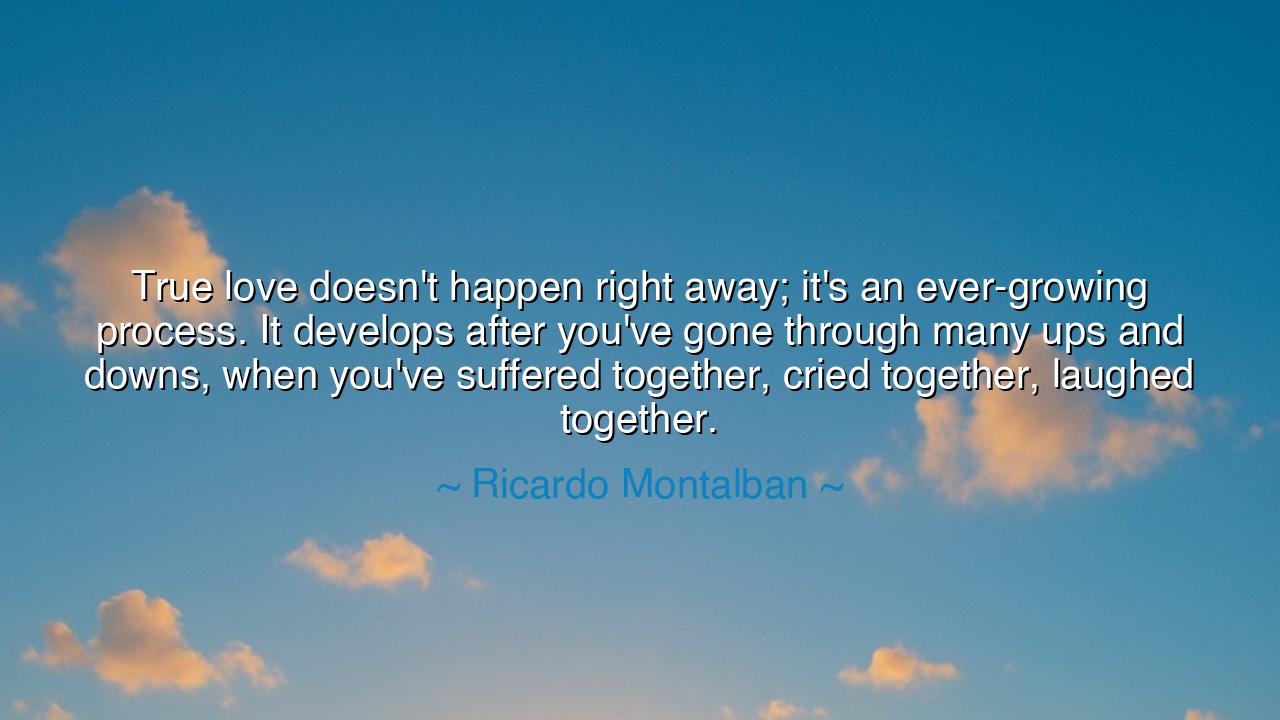
True love doesn't happen right away; it's an ever-growing
True love doesn't happen right away; it's an ever-growing process. It develops after you've gone through many ups and downs, when you've suffered together, cried together, laughed together.






"True love doesn't happen right away; it's an ever-growing process. It develops after you've gone through many ups and downs, when you've suffered together, cried together, laughed together." These words, spoken by Ricardo Montalban, speak to the very heart of what it means to love deeply and authentically. In our time, we are often bombarded with the notion of love as an instantaneous, effortless connection — something that happens the moment you meet someone, a spark that ignites instantly. However, Montalban’s wisdom reminds us that true love is not a fleeting moment or a superficial emotion; it is a slow, evolving process that is built over time, forged in the fires of life’s challenges and strengthened through shared experiences of joy and sorrow.
The ancients understood the value of love as a journey, not a destination. The Greeks spoke of philia, the deep bond of friendship and mutual respect that forms over time and through shared experiences. Aristotle believed that the deepest and most lasting loves were those that were built over time, where both individuals grow and change together. To him, love was not a simple feeling but a shared commitment to virtue, growth, and shared wisdom. True love, Aristotle would say, is not something that can be rushed or forced; it is the product of many shared moments, some joyous and others difficult, that deepen the bond and understanding between two people.
Think of the story of Odysseus and Penelope, two figures from the ancient Greek epic The Odyssey. Their love was not forged in a single moment but through years of separation, suffering, and uncertainty. Odysseus faced countless trials on his journey home, but his love for Penelope remained steadfast, as did hers for him. The story of their love is not one of instant passion or effortless connection, but one of enduring loyalty and patience. Penelope, waiting for her husband’s return for twenty years, did not simply endure the absence but lived in hope, holding onto the bond they had created long before his journey began. Their love was tested by time, by distance, by hardship, yet through it all, it grew stronger. True love, in their case, was the slow process of enduring life’s challenges and emerging together on the other side, forever changed by the experience.
Consider also the Roman ideals of duty and family, which were deeply tied to the concept of love. In ancient Rome, the foundation of society was the family, and love within the family was often expressed not through grand gestures but through shared commitment and sacrifice. Cicero, the Roman philosopher, spoke of affection and loyalty as the cornerstones of enduring relationships. True love, he suggested, was built upon mutual trust, respect, and the ability to face life’s challenges together. The family unit was central to Roman society, and it was through facing suffering and loss together that the love between its members grew and matured. In this way, the Romans understood that true love is not a transient feeling, but a continuous process that is strengthened by the ups and downs of life.
In our own modern lives, we often seek immediate satisfaction and expect love to be something that is easy and instantaneous. Instant gratification has become the norm in many aspects of life, and this extends to our relationships as well. But Montalban’s words remind us that lasting love is not found in perfection or in the absence of struggle; it is found in the willingness to face challenges together, to support each other through sorrow, and to celebrate joy in one another’s presence. True love is an investment, a decision made daily, and it is nurtured through shared laughter, tears, and moments of vulnerability. It is in these moments that the bond between two people grows, and love becomes more than a feeling — it becomes a way of life.
Think of the enduring love of Marie and Pierre Curie, whose groundbreaking scientific work was not only a testament to their intellectual brilliance but to their deep and shared love for discovery and for each other. Marie Curie, after the death of her husband Pierre, continued their work in radioactivity, driven not only by her own passion but by the shared vision she and Pierre had created together. Their love for science, for knowledge, and for each other sustained Marie through the most devastating loss, and it was in this partnership that she became one of the greatest minds in science. Their love grew in the shared pursuit of a common goal, shaped by both their triumphs and their shared suffering. The Curies’ story is a powerful example of how true love is a process — a constant evolving partnership that grows through adversity.
The lesson from Montalban’s words is clear: love is not a fleeting moment, but a deep, evolving connection that requires patience, commitment, and shared experiences. It is only through facing life’s ups and downs together that we can truly understand the depth of our bond and grow stronger in our love. Whether it’s through suffering, laughter, or joy, love becomes something that transforms us, that teaches us the true meaning of partnership. So, my children, seek not the fleeting thrills of love, but the steadfast companionship that comes from building something beautiful and enduring. Let your love grow, and know that as you face life’s challenges together, you will find a deeper and more lasting connection with those you hold dear. True love is an ongoing journey — one that is worth every moment, every trial, and every triumph.






AAdministratorAdministrator
Welcome, honored guests. Please leave a comment, we will respond soon